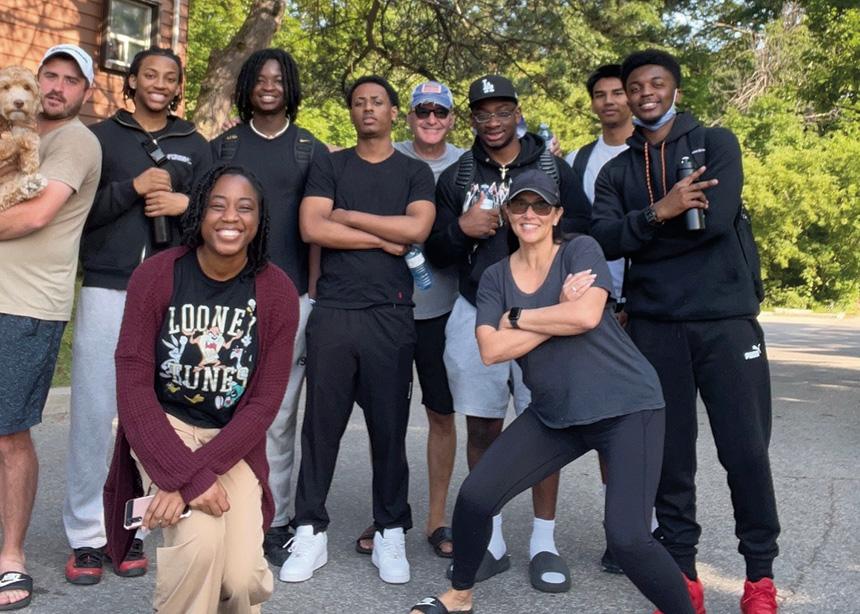During her community outreach work, Judith McCartney will typically ask people: “Did you know Christ walked 22,000 miles in his lifetime of ministry?”
McCartney believes in venturing outside the church doors and putting on some miles.
She’s spent nearly 40 years in ministry and non-profit work, and she worries that churches do not focus enough on growth. In her assessment, they prioritize establishing sustainability within the walls of their worship facilities at the expense of connecting with neighbours in the community and marketplace. She feels this approach will lead to the death of churches and faith-based non-profits.
On a grey afternoon in the middle of October, I met McCartney at Good Shepherd Community Church in Scarborough, Ontario. She works part time at Good Shepherd and part time for Connect City in Toronto.
Sitting on the wooden steps before the worship hall, she tells me she is now entering the “twilight years” of her ministry, thinking about passing the work along. She finds herself thinking about Elijah and Elisha in the Old Testament.
“He has this mantle, and he just throws it at Elisha,” says McCartney, adding that readers often gloss over this detail.
“I don’t want to hand off the mantle that way,” she says.
McCartney began her career in the projects of Grand Rapids, Michigan, and then attended Bible college in Ontario. By 1984, she had commenced urban work in Toronto. Through the decades, she has focused on empowering people for leadership.
Nine years ago, Judith and her husband, Colin McCartney, launched a faith-based non-profit called Connect City in Toronto. Mennonite Church Eastern Canada provided a 10-year grant for the work. By that time, both McCartney and her husband were ministry veterans with years invested in exactly this type of work.
They were coming from Urban Promise Toronto (UPT), an inner-city ministry they’d started in 1998. As Colin McCartney described in his 2008 book, The Beautiful Disappointment: Discovering Who You Are Through the Trials of Life, UPT was an inner-city ministry that served children, youth and their mothers living in “high-risk” communities.
Through this ministry, the McCartneys developed a Street Leader Program which trained teens and young adults to become leaders in their own neighborhoods. Youth who joined the program lived in communities plagued by gang violence, drug dealing and a lack of socially acceptable ways to earn an income.
They moved on from this project in 2012. Like UPT, Connect City uses outreach to bring the gospel to people. McCartney explains that the key is to do it in a way that is culturally relevant.
“In the 1950s, you know what was culturally relevant? Sunday School,” she says. “Everybody went to church. Everybody doesn’t go to church now.”
She notes that Jesus’s ministry was full of taboos; he hung out at the well, attended parties and healed on the Sabbath. McCartney says all these activities serve as examples of growth and innovation for modern ministry.
This model informs Connect City.
“We don’t really have a cookie cutter way of ministering to people,” says McCartney. “We sit there and ask the Lord and look around to see what is relevant.”
The core of their mission is to help followers of Jesus join one another in unique expressions of church and to grow in Christ.
Currently, Connect City runs four of these types of unique expressions.
Warden Underground is a church plant located in a government housing project in Southern Scarborough. Youth who attend participate in leadership and confidence-building activities.
Screenfish Toronto uses film and pop-culture to foster faith-based dialogue.
SoulHouse opens its doors to people who have been hurt by the church in their past. McCartney hosts this group in her home through weekly dinners. She welcomes people of all ages, beliefs and walks of life to sit around her harvest table to enjoy a meal and open discussion on scripture.
Unity is Connect City’s newest ministry. Five years ago, someone staying at a nearby hotel approached the McCartneys and told them the hotel was sheltering asylum seekers. The person suggested the McCartneys come take a look.
By Christmas Eve of that year, Connect City arrived at the hotel with face painters, arts and crafts workshops, two volunteers dressed like Santa Claus and 800 gifts for the children.
What began as a holiday gesture gave way to Unity, a ministry devoted to displaced children and families living in emergency housing situations.
Currently, they provide weekly movie nights, evening programs to school-aged children and Christmas parties. They developed Camp Unity, which runs in the summer and extends its programs to homeless children and children of refugees. The goal of this ministry is to help connect newcomers with Canadian culture and with Jesus.
“I guess part of my passion is that I was an immigrant,” says McCartney. “I was poor. We had to figure things out. We looked different.”
McCartney is originally from Indonesia. Her family immigrated to Canada in the ’70s. They were the only non-white family in Woodstock, Ontario. She remembers her brothers being bullied.
At age 11, she lost her mother to a brain aneurysm. To keep a promise he’d made to her mother, McCartney’s father left a lucrative job as a truck driver for work in a factory. This significantly reduced the family’s income. In his grief, her father also became ill.
“The household was starting to dilapidate,” says McCartney. “I had to lie about what I got for Christmas because all my friends were getting Christmas presents.”
By December 2024, the MCEC grant will dry up. As the time to move on draws closer, McCartney grows concerned over what she will leave behind for future generations and how she will pass on the mantle.
She feels an urgency in helping churches understand that ministries must be balanced between work within the walls of the church and putting on some miles in the community.
“I say this humbly, you know,” McCartney says. “I feel like we need to leave something for seven generations to come—without our names on it. I don’t want my name on it.”





Add new comment
Canadian Mennonite invites comments and encourages constructive discussion about our content. Actual full names (first and last) are required. Comments are moderated and may be edited. They will not appear online until approved and will be posted during business hours. Some comments may be reproduced in print.